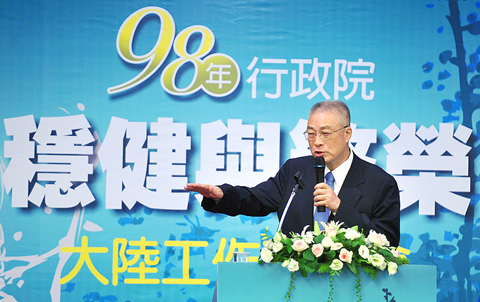Taiwan must consolidate relations with other democracies and maintain self-defense capabilities, Premier Wu Den-yih (吳敦義) said yesterday ahead of another round of cross-strait talks scheduled for December.
Wu said Taiwan could not safeguard its national security and the wellbeing of its people based solely on cross-strait detente.
Advising civil servants on the government’s cross-strait policy, Wu said that its policies hinged on two principles: maintaining the integrity of the sovereignty of the Republic of China and ensuring the interests of Taiwan’s 23 million people.

PHOTO: LIU HSIN-DE, TAIPEI TIMES
“While improving our relationships with [China], we must also consolidate ties with the US, Japan, Europe and other freedom-loving countries governed by the rule of law in terms of political, diplomatic and economic relations while shoring up self-defense military strength,” Wu said.
“Putting Taiwan first for the benefit of the people” remains the government’s paramount principle in determining cross-strait policy, Wu said.
“We should not do things that are not beneficial to the public,” he said. “Those who execute cross-strait policies should act as gatekeepers when necessary and step on the brakes where necessary to maintain these principles.”
Wu said the proportion of the country’s exports to China and Hong Kong had risen to 40 percent of its total annual exports, or about US$130 billion per year.
“The trade surplus we have with China last year was higher than the annual government budget ... We need to enhance economic ties with Japan, the US and ASEAN countries,” he said
Wu said the government’s plan to sign an economic cooperation framework agreement (ECFA) with China remained essential.
“How can we ignore the huge market [of China] and the rising biggest factory in the world?” he said.
The planned formation of free-trade zones consisting of ASEAN plus China and ASEAN plus China, Japan and South Korea would cause local businesses to lose their competitive edge, which makes the ECFA imperative, Wu said.
In a related development, Mainland Affairs Council Deputy Minister Liu Te-shun (劉德勳) said yesterday that the next round of cross-strait talks had been tentatively scheduled to be held in Taichung in December.
The decision was reached when Straits Exchange Foundation Secretary-General Kao Koong-lian (高孔廉) and his Chinese counterpart, Association for Relations Across the Taiwan Strait Deputy Chairman Zheng Lizhong (鄭立中), met in Hangzhou in China’s Zhejiang Province on Tuesday.
Kao and Zheng discussed four issues to be addressed during the meeting in Taichung: fishing industry cooperation, quality checks for agricultural products, cross-strait cooperation on the inspection and certification of products and preventing double taxation.
Liu dismissed speculation that Kaohsiung or other places in southern Taiwan had been blacklisted as possible summit venues because of recent events that displeased China, such as the Dalai Lama’s visit to Taiwan and the screening of a documentary about Uighur activist Rebiya Kadeer in Kaohsiung.
Since southern Taiwan was hit hard by Typhoon Morakot in August, Taichung was considered a more suitable location for the talks, Liu said.

‘ABUSE OF POWER’: Lee Chun-yi allegedly used a Control Yuan vehicle to transport his dog to a pet grooming salon and take his wife to restaurants, media reports said Control Yuan Secretary-General Lee Chun-yi (李俊俋) resigned on Sunday night, admitting that he had misused a government vehicle, as reported by the media. Control Yuan Vice President Lee Hung-chun (李鴻鈞) yesterday apologized to the public over the issue. The watchdog body would follow up on similar accusations made by the Chinese Nationalist Party (KMT) and would investigate the alleged misuse of government vehicles by three other Control Yuan members: Su Li-chiung (蘇麗瓊), Lin Yu-jung (林郁容) and Wang Jung-chang (王榮璋), Lee Hung-chun said. Lee Chun-yi in a statement apologized for using a Control Yuan vehicle to transport his dog to a

Taiwan yesterday denied Chinese allegations that its military was behind a cyberattack on a technology company in Guangzhou, after city authorities issued warrants for 20 suspects. The Guangzhou Municipal Public Security Bureau earlier yesterday issued warrants for 20 people it identified as members of the Information, Communications and Electronic Force Command (ICEFCOM). The bureau alleged they were behind a May 20 cyberattack targeting the backend system of a self-service facility at the company. “ICEFCOM, under Taiwan’s ruling Democratic Progressive Party, directed the illegal attack,” the warrant says. The bureau placed a bounty of 10,000 yuan (US$1,392) on each of the 20 people named in

The High Court yesterday found a New Taipei City woman guilty of charges related to helping Beijing secure surrender agreements from military service members. Lee Huei-hsin (李慧馨) was sentenced to six years and eight months in prison for breaching the National Security Act (國家安全法), making illegal compacts with government employees and bribery, the court said. The verdict is final. Lee, the manager of a temple in the city’s Lujhou District (蘆洲), was accused of arranging for eight service members to make surrender pledges to the Chinese People’s Liberation Army in exchange for money, the court said. The pledges, which required them to provide identification

INDO-PACIFIC REGION: Royal Navy ships exercise the right of freedom of navigation, including in the Taiwan Strait and South China Sea, the UK’s Tony Radakin told a summit Freedom of navigation in the Indo-Pacific region is as important as it is in the English Channel, British Chief of the Defence Staff Admiral Tony Radakin said at a summit in Singapore on Saturday. The remark came as the British Royal Navy’s flagship aircraft carrier, the HMS Prince of Wales, is on an eight-month deployment to the Indo-Pacific region as head of an international carrier strike group. “Upholding the UN Convention on the Law of the Sea, and with it, the principles of the freedom of navigation, in this part of the world matters to us just as it matters in the